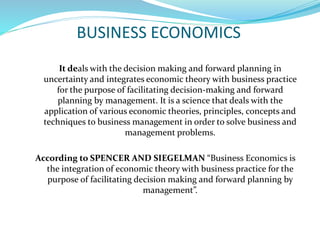Business and Economics Strategies for Sustainable Growth in a Shifting World
Business and Economics Strategies for Sustainable Growth in a Shifting World
Blog Article
The Duty of Economics in Service Approach: Insights for Business Owners
The combination of financial principles into organization technique is important for entrepreneurs intending to browse complex market environments. By realizing ideas such as supply and demand, chance cost, and market structures, business leaders can craft approaches that not just address present market problems but additionally anticipate future patterns.
Understanding Economic Principles
While many organization leaders focus on operational techniques, a solid grasp of financial concepts is important for educated decision-making and strategic planning. Understanding concepts such as supply and demand, possibility cost, and market structures can critically shape a business's technique to competitors and resource allocation.
Supply and demand dynamics determine rates strategies and supply administration. Acknowledging shifts in consumer preferences allows services to readjust their offerings proactively, maximizing sales and improving client fulfillment. Possibility expense, the worth of the next finest alternative inevitable, urges leaders to assess the potential advantages of different calculated options, guaranteeing resources are assigned efficiently.
Furthermore, experience with market structures, such as best competition, syndicate, and oligopoly, notifies competitive positioning and valuing techniques. A deep understanding of these economic structures allows leaders to expect market changes and respond suitably, decreasing threats and utilizing on possibilities.
Inevitably, the integration of economic concepts right into company strategy not just helps with better functional decisions yet also promotes resilience in an ever-evolving industry. By prioritizing economic proficiency, entrepreneurs can improve their critical insight, making sure sustainable development and an affordable edge.
Market Need Analysis

Comprehending market demand helps companies anticipated sales quantities and readjust their supply monitoring appropriately. It likewise allows companies to recognize market segments that are underserved or hold significant growth potential (Business and Economics). Additionally, analyzing economic indicators and seasonal fluctuations can provide valuable context for need adjustments gradually
Moreover, a robust market demand analysis enables entrepreneurs to make educated decisions about item growth and advertising and marketing methods. By straightening their offerings with consumer demand, businesses can improve customer satisfaction and commitment.

Prices Strategies and Methods
Recognizing market demand not only notifies product offerings but additionally plays a substantial function in forming effective prices strategies. Entrepreneurs need to analyze consumer habits and readiness to pay, as these factors are vital in developing a price factor that optimizes earnings while staying eye-catching to customers.
One extensively made use of prices technique is value-based prices, where prices are set based on perceived value instead than expense. This technique ensures that all expenses are covered but may overlook market conditions.
Dynamic prices is one more innovative technique, permitting organizations to adjust costs in real-time based upon demand changes. This strategy is especially efficient in markets like traveling and hospitality, where consumer demand differs substantially.
Additionally, emotional prices, such as establishing costs simply below a rounded number (e.g., $9.99 instead of $10), can affect client perception and investing in decisions. By using a combination of these methods, business owners can efficiently place their products in the marketplace and optimize productivity.
Competition and Market Framework
In the realm of service strategy, the nature of competition and market framework plays a critical role in figuring view publisher site out a company's method to attaining a competitive advantage. Comprehending the characteristics of competition assists business owners identify their market setting and tailor methods accordingly. Market frameworks can usually be categorized as ideal competitors, monopolistic competitors, oligopoly, and monopoly, each presenting unique obstacles and opportunities.
In a flawlessly affordable market, companies contend mainly on cost, necessitating a focus on price performance and technology to keep margins. Oligopolistic markets, defined by a few dominant gamers, call for business to be really conscious of competitors' activities, leading to critical connection.

Consumer Habits Insights
Just how do customer choices and behaviors affect service methods in an affordable landscape? By assessing fads, preferences, and purchasing patterns, companies can tailor their offerings to satisfy the progressing demands of their target market.
Data-driven understandings into consumer actions allow companies to segment their markets effectively, identify key demographics, and develop targeted advertising projects. For example, organizations can utilize behavior analytics to prepare for changes in customer demand and adjust their inventory, pricing, or promotional strategies as necessary. This responsiveness not just boosts client contentment yet likewise fosters brand loyalty and retention.
In addition, recognizing consumer behavior can educate product advancement, allowing companies to innovate and develop options that resonate with their target market. In a landscape defined by rapid adjustment and intense competitors, staying attuned to customer choices is vital. Ultimately, the capacity to adapt organization methods based upon customer understandings can considerably influence a company's success and sustainability in the industry.
Final Thought
In conclusion, the integration of economic concepts into business approach is important for business owners aiming to browse complicated market settings - Business and Economics. An great site extensive understanding of market need, rates approaches, competition, and customer behavior outfits services with the devices needed to grow and adapt. By leveraging these understandings, entrepreneurs can make educated choices that align with market dynamics, inevitably enhancing resilience and advertising lasting development company website in an ever-evolving affordable landscape
The integration of economic principles right into company approach is critical for entrepreneurs aiming to browse intricate market environments. By grasping concepts such as supply and need, possibility price, and market structures, service leaders can craft methods that not just address present market conditions but additionally anticipate future trends.A detailed market need evaluation is crucial for organizations intending to maximize their item offerings and rates techniques.In final thought, the assimilation of economic principles right into business strategy is essential for entrepreneurs aiming to navigate complex market environments. A detailed understanding of market need, prices methods, competitors, and customer actions outfits organizations with the tools required to adapt and flourish.
Report this page